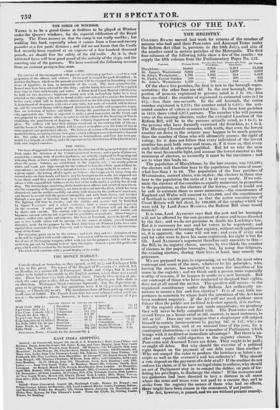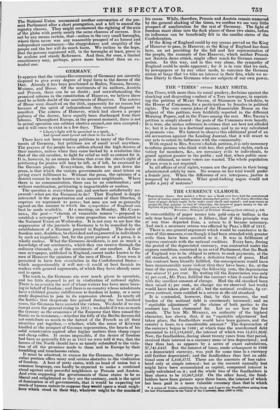TOPICS OF THE DAY.
THE REGISTRY.
COLONEL EVANS moved last week for returns of the number of persons who had paid their Poor-rates and Assessed Taxes under the Reform Act (that is, previous to the 20th July), and also of the number rated in certain parishes of the Metropolis. The first four columns of the following table show a few of the results : we supply the fifth column from the Parliamentary Paper No. 232.
than one-third : the number of registered to estimated votes is 3 to 21,L—less than one-seventh. In the old borough, the entire number registered is 2,278; the number rated is 6,695; the esti- mated number of voters is somewhat less. In these four parishes in 1818, there voted 4,073 persons. The number who will possesi votes at the ensuing election, under the extended flanchise of the Reform Bill, will be to the persons actually rated, as 1 to 3; to the persons who have formerly exercised the franchise, as 1 to 2. The Morning Chronicle remarks, with truth, that even the lowest number set down in the returns may happen to be much greater than the number of those who will ultimately possess the right of voting; for it does not follow that every individual of the lowest number has paid both rates and taxes, or, if it were so, that every such individual is otherwise qualified. But let us take the case in the most favourable light, and assume the lowest number as the minimum of electors, as assuredly it must be the maximum ; and see to what this leads us.
The population of Marylebone, by the last census, was 122,206; the electors will therefore bear to the population the ratio of some- what less than 1 to 40. The population of the four parishes of Westminster, noticed above, was 80,054; the electors in these also bear to the population the ratio of 1 to 40 very nearly. If we esti- mate the electors of the counties as equally numerous, in proportion to the population, as the electors of the towns,—and it would not be safe to estimate them as more numerous,—the constituency of England and Wales will amount to 345,000, and the constituency of Scotland to 60,000 persons; so that the entire coustituency of Great Britain will fall short, by 100,000, of the number which we were told by Lord JOHN RUSSELL the Reform Bill alone would furnish!
It is true, Lord ALTHORP says that the scot and lot boroughs will not be affected by the non-payment of rates and taxes directed by the Act ; and we do not presume to doubt his Lordship's law. But it is necessary for scot and lot voters to be registered ; and there is no means of insuring that registry, without such appliances as, it is apparent, the voter will not use; and even if every scot and lot voter were to have his name registered, his right is but for life. Lord ALTHORP'S argument therefore only amounts to this— the Bill, by its registry clause, narrows by two thirds the number of electors in the popular boroughs; but, by using due diligence, the existing electors, during their lives at least, may remedy the grievance. We are prepared to join in expressing, as we feel, the most utter contempt and scorn of the man, whatever be his priuciples, who, having the means, has neglected to secure the insertion of his name in the registry; and we think such a person more especially worthy of censure, if lie happen to reside in a new borough. But our contempt of those who have neglected or despised their rights, does not at all mend the matter. The question still recurs--is the registered constituency under the Reform Act sufficiently nu- merous to insure a fair and free election ? It is of very little im- portance to ascertain by whose fault the intentions of the Act have been rendered nugatory. If the Act will not work without more labour than the public are inclined to bestow upon it, it is useless. If the registry clauses are not made compulsory, we prophesy they will never be fully complied with. The Poor-rates and As- sessed Taxes on a house rated at 30/. amount, in most instances, to 10/. or 15/. Does any one imagine that a shopkeeper will subject himself to certain inconvenience by paying 10/. or 15/., whea no necessity urges him, and at an unusual time of the year, for a contingent abstraction,a vote for a member of Parliament, which brings with it no direct or immediate advantage? But there is an- other and equally valid objection to the registry clauses. The Poor-rates and Assessed Taxes are debts. They ought to be paid ; so ought all debts: But why should the exercise of a political right depend on the payment of one debt more than another ? Why not compel the voter to produce the butcher's or baker's re- ceipts as well as the overseer's and tax-collector's? Why should a vote. depend on the payment of a debt at all? If the creditor do not enforce his claim, or if he have no legal claim to enforce, why should an act of Parliament step in to compel the debtor, on pain of for- feiting his privileges, to discharge the claim? If the overseers and tax-gatherers had been directed to levy a distress in all cases where the rates and takes were not paid by a certain day, awl to strike from the registry the names of those who had no effects. :there might have been reason in the enactment, if not justice. The Act, however, is passed, and we are without present remedy.
Ptui,hes, Persona Sated.
Tihe„ave rergi,j,iths,"oz.
Homes.
MarylebOne 10,088
2,954 5,411 21,630
St. James's, Westminster 3,032
891 1,679 :3,087 St. John's, Westminster... 1,791
1,025 554 1,887 St. Paul's, Covent Garden 549
293 298 435 St. Anne's, Westminster 1,323 ' 5:35 554 1,300
Of the above five parishes, the first is new in the borough repre- sentation ; the other four are old. In the new borough, the pro- portion of persons registered to persons rated is 3 to 10,—leSs
The National Union recommend another convocation of the pre- sent Parliament after a short prorogation, and a bill to amend the registry clauses. They might recommend the righting of the axis of the globe with pretty nearly the same chances of success. It is not by any means certain, that—unless in the very small boroughs, where there never was any reasonable prospect of an honest and independent constituency—the sluggishness and stupidity of the people and the law will do much harm. We incline to the hope,
i that the persons registered will, n the boroughs at least, prove to be zealous and sturdy Reformers. And thus, for once, a limited constituency may, perhaps, prove more beneficial than an ex- tended one.



























 Previous page
Previous page